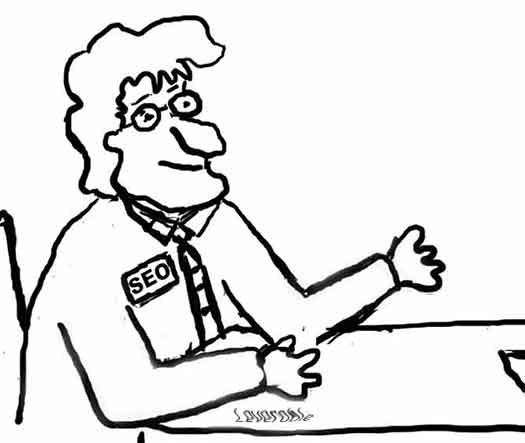
One of the first digital problems to solve for your business is to figure out what type of SEO service delivers the best value. This will help set expectations before starting an engagement. And if things do take a wrong turn in your first attempt, you’ll have nailed down the requirements for your SEO team and can charge ahead.
Having worked inside both agency and consultancy worlds, I’ve been able to observe their strengths and weaknesses from the inside.
Let’s explore the differences in the two and which service might work best for you.
Consultant vs. agency business models will vary, but compare the risk they take to the risk you take when you sign on as a client. An agency or consultant stands to lose one client. You as the client, risk losing revenue and growth. And if you really get it wrong, you could lose things like your domain authority or reputation should your new SEO company tilt toward the black hat side. The risks are yours, so the responsibility is on you.
How do you assess whether you need an SEO consultant or agency?
- What’s an Agency?
- Types of Digital Marketing Agencies?
- Agency Benefits
- Agency Downsides
- SEO Consultant Benefits
- SEO Consultant Downsides
- Conclusion
What’s an Agency?
An agency exists to provide marketing services and advice to a client. In the world of organic search, that means deciding what strategies need to be implemented on and off the client’s web properties to improve performance. Detailed thinking about keyword research, semantics, site structure, content and inbound links.
But, the ideal goes beyond services.
I like this lofty definition of agency from Andrew Bailey:
“An agency is all about collaboration – with its clients and with its people. It is important to create the right environment for your people to thrive, starting with building an exceptional leadership team, recruiting an unfair share of the world’s best talent and giving that talent the tools and support to succeed. Any agency succeeds or fails by the caliber of its people and how they collaborate. So in that way, and especially within the digital space, an agency is defined as a group of excellent people collaborating around a difficult challenge and finding solutions that drive our clients’ business.”
With words like “collaboration,” “team,” “talent,” and “people” you can just feel the angst involved in finding, pleasing and keeping that perfect team intact. And how difficult it would be to scale an ideal like this. If the quintessential agency were a rock band, they’d be more like Aerosmith than Yngwie Malmsteen.
What are the Different Types of Digital Marketing Agencies?
On your quest for rock star digital marketing services, you’ll come across several different types of agencies that offer SEO. Let’s break down some of the different options available and look at some examples.
Full Service Agencies
Think of a full service agency as a one-stop-shop for all of your digital marketing needs. These agencies handle all the online marketing and advertising components of your biz, including strategic planning, creative, ad purchasing, production and interactive services. Remember full service gas stations? One or more people pump, check the oil and wipe your windshield. Your job is to sit and wait in your car until they’re done, pay and leave.
An example of a full service digital marketing agency is 360i. They’re an established name and work with leading brands in Atlanta GA and globally. Equally with SEO, you’ll see them touting other services like consumer insight, influencer marketing, technology, digital education and training, as well as a plethora of other “capabilities.” Almost all the work appears to be done in-house.
As stated, one of the benefits of working with a full service agency is the one-stop-shop appeal. You can walk in the door, an attractive person will take your coat and offer you a cup of espresso in fine china and you’ll get the full meal deal. Their capacities are as wide as they are deep; their walls full of awards.
Full service agencies like to compete. They’re hungry to be top dog. They acquire, grow, and promote their brands. Because of this, they are sometimes more willing than smaller agencies to let mediocre work go out the door. Prospective clients, especially new brands that are emerging and not well-known, may fear getting lost among so many big names.
Small Agencies
These types of agencies, typically locally owned, focus on delivering specific services such as pay-per-click, social media or local search marketing. They may have had strong successes with SEO and offer the service as one of their specialties. Their results can be as good or better than full service firms. They just aren’t big enough to offer every single service a client might need. These smaller, independent players can step into the void and take risks that full service companies cannot. If you want to propose a risky new strategy, small agencies will be more than happy to accommodate.
With so many digital marketing companies popping up, it’s safe to expect that some of the small specialist agencies won’t make it and will have to close up shop. If you decide to work with a small agency, be ready for that risk. Also, know that they only offer very specific forms of service. If you want a service these companies do not offer, you’ll have to take your business elsewhere or become the guinea pig.
Boutique Agencies
Agencies with super talented designers have a way of earning respect from clients that gets their foot in the door for other services. A creative-focused agency that does SEO or PPC well is going to integrate these services into their offerings. Syrup, an Atlanta-based agency that seems to fit the boutique definition, has an history of delivering great design to small companies. Thus, they’re able to expand their team of experts and offer more marketing-related services like paid media and analytics.
Is the small size of boutiques a plus or minus? While you can enjoy working with a personal touch and a quick response, the work may not be packaged in a slick manner, as some of the projects they may have to bootstrap for you. Process and procedure may not be the priorities of artists who create as they go.
Niche Agencies
What profession wouldn’t have a little more respect for an SEO agency that specialized in their industry? Agencies that work only in a particular niche have the strong selling point of vertical expertise to hook new clients in the automotive, medical, tech or just about any type of industry. Plumber SEO is a great example. This company offers marketing services JUST for plumbers. JD Rucker’s Dealer Authority offers to get more car shoppers to dealership websites through advanced search, social, and inventory marketing.
If you’re looking for a speak-your-language agency, niche agencies like these are hard to ignore. The biggest red flags I’ve seen with the niche agencies are that they go to the same sources for content and links. So, you may end up with the same or similar content and backlink profiles as competitors. Not good.
Now for the good and bad of SEO agencies.
What Are Benefits of Hiring an Agency?
- Collective Knowledge: With so many brains immersed in the best SEO practices for your biz, more resources are available to you. The ability for an agency to always set a pair of fresh eyes on an account is more difficult with a consultant. I believe this represents the biggest unfair advantage that agencies have over consultants, especially full service agencies.
- More Financial Solvency and Stability: Reputable agencies have a solid financial foundation, sometimes enabling them to substantially lower their costs.
- Friends in High Places: Agencies may be able to build long-lasting relationships with huge ad platforms. They can also try and lean on their Google or Facebook teams for guidance on how to handle components of an account. This helps gain exclusive insights that may not be as available with a smaller consultant operation.
- Flexibility: If you don’t like the account manager assigned to you, ask for another.
What Are the Downsides of Hiring an Agency?
- Workplace Turnover: Ah, such is agency life. Some agencies, especially younger ones, can be like the workspace version of Survivor. Who will be booted next? An agency with a high turnover rate of employees might lose your account in the shuffle, along with your wants and needs. When Mary, who has been working on your account for months, moves on and gets replaced by Bob, he’ll have to get familiar with your SEO game plan, which could take weeks. With so many different accounts changing hands, expect a learning curve as employees get caught up on the nuances of your brand.
- Expensive: Large agencies that work with established brands can be pricey. If they’re not working with small businesses and you ARE a small business, chances are they’ll be out of your price range. Each team member has to get paid a salary. The agency investors also must earn a profit.
- Bureaucratic Bubble Living: As “The Father of Advertising,” David Ogilvy, once said,
“Our business is infested with idiots who try to impress by using pretentious jargon.”
That’s a bit extreme but some SEO agencies remain set in their ways. That’s fine for some industries but not for search engine marketing, which sees big changes every year. Bold thinking and testing of new tactics is a must.
- The Shiniest Wheel Gets the Oil: Some agencies get tempted to focus their resources on higher paying clients. If you can’t afford to spend big bucks, your needs could come second. Consultants do this too, they’re just easier to catch.
- Not Handling with Care: The success of your SEO plan rests on a delicate balance between expert service and committed experts. Since the turnover rate can be high among some agencies, your account services person may not have hands on experience performing SEO.
Whew, that was a lot to get through. Now, let’s look at the pros and cons of hiring an SEO consultant to handle the nitty-gritty of your account.
What’s this SEO Consultant You Speak of?
A consultant provides professional expert advice. An SEO consultant brings you one-on-one information and guidance on your company’s search engine optimization strategy. Expect him to have an intimate knowledge of the inner workings of SEO and how to develop and promote content to attract visitors that increase revenue.
An SEO consultant is specialized in their field and focuses primarily on organic search. Clients should expect them to possess the skills and experience to improve their search visibility. Their goal is to get you results from organic search.
If you want an expert who will address your organic needs head on until results come through, an SEO consultant will get you there or die trying.
Now for the peaks and valleys of SEO consulting.
Advantages of Hiring an SEO Consultant
- Dirty Hands on: A good consultant should provide clear goals and objectives based on what he knows works. The consultant is usually willing to get his hands dirty and fill in the gaps with implementation where they may lack. Just get ‘er done!
- A Lean, Mean Personal Approach: David beat Goliath with technology and courage. Unlike agencies, consultants have only a few folks working for their company. If you pick the right consultant, you’ll have a small team of rock star marketers in your corner that can develop a strategy customized just for you. This usually means that the account service person (if there is a separate one) is also an expert in their field, giving seasoned recommendations and in some cases, even implementing them.
Steve Jobs famously said,
“A small team of A+ players can run circles around a giant team of B and C players.”
It’s hard to imagine a lean, mean band of consultants giving you groupthink and endless meetings.
- The Cook Is the Owner: A consultant can’t really hand the ball off to someone else on the team or shirk responsibility. He is accountable in personal sort of way. Think about the restaurants that serve the food you love the most. In how many does the cook come out and greet you and make sure the food suits your taste?
- Big Bang, Low Bucks: Consultants have much lower overhead than agencies. With a consultant, you can enjoy the expertise that you’d expect from an agency but usually at lower prices. Since consultants take on fewer clients, they give each account strong individualized attention and access to their brain trust.
Cons of Hiring an SEO Consultant
- Lack of Diversification: To some clients, SEO equals digital marketing. Once they know they can trust a consultant for better organic search, it’s just a matter of time before they’ll ask about other digital marketing channels. Your SEO guy may understand that Snapchat would be a profitable marketing channel for you but not have the expertise to pull it off. A consultant won’t have a department to call for answers outside of his expertise. He’ll have to bring in a partner to help or send you elsewhere.
- They Eat What They Kill: Some consultants may be willing to blast into uncharted territory for solutions and learn a new marketing channel that doesn’t directly relate to SEO. We’ve done this in the past at Leverable but it’s not always practical. Dropping everything to develop a new marketing channel makes the consultant stronger but can create bottlenecks in the SEO campaign.
- Longer Lead Time: Consulting firms need more lead time than agencies since they are smaller, resulting in potential gaps in service. There’s only so much a small group of experts in high demand can do. Unlike agencies, the lean and mean consulting company may not have a receptionist. You may have to rely on a response from a voicemail or email.
Do You Need an SEO Consultant or an SEO Agency?
Before you decide between consultant and agency, take inventory of everything you are trying to accomplish with your digital marketing strategy. Knowing what you need from SEO means intimately knowing where your true business problems lie. Sometimes that’s not so easy.
Consultant vs. agency is not always a clear-cut difference. Some small agencies are more like consultancies; big consultancies like agencies. What’s the core difference that separates the two?
Consider the word “consult.” It implies that you are speaking with someone you that you have an established relationship with, someone you trust, someone who is an expert. The word “agency” feels less personal to me.
They’re both just names. With either you can find someone who is truly a trustworthy expert in SEO. Regardless of which you end up with, make sure that you’re able to truly “consult” with your SEO advisor.




